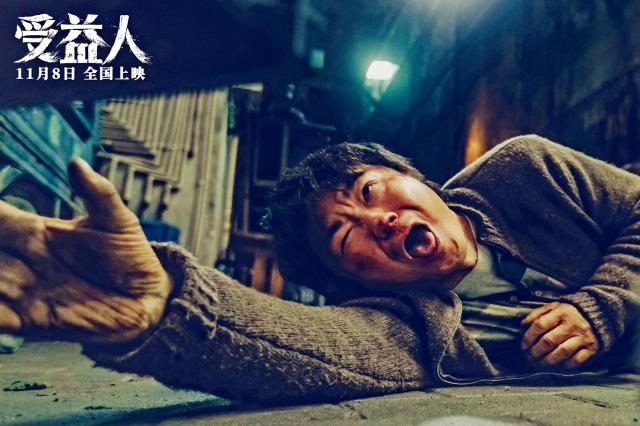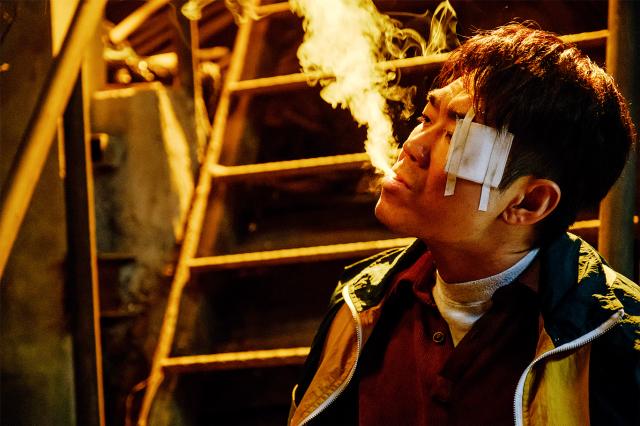Unlike most other film production companies in Beijing, which are located in high-end offices or quiet art districts, Ning Hao’s Dirty Monkeys Studio set up shop in the gritty eastern suburbs. The area mostly consists of auto repair shops, used car lots and warehouses. Dust often swirls through the air. The noisy, dirty surroundings resemble scenes from his films. Since late 2016, Ning has been busy signing young directors to his studio’s stable, such as Wen Muye (Dying to Survive, 2018), Lu Yang (Brotherhood of Blades, 2014) and Shen Ao (My Dear Liar, 2019). Ning, a director turned producer, emphasized that he only plays a supporting role and directors always have the final say on their projects. Ning’s catalogue of work mostly consists of medium-budget films that tackle realistic themes and feature grassroots protagonists. Since heading his own studio, Ning said his main focus is his Young Director Project, which aims to train and support directors in developing their work.
Ning’s project to train young talent started in 2015 after he wrapped on Breakup Buddies (2014), a romantic comedy set in Southwest China’s Yunnan Province that eventually raked in US$189 million internationally.
In 2015, Chinese mainland box offices took in a total of 44 billion yuan (US$6.3b), an increase of 48 percent year-on-year. The industry attracted a growing number of profit-hungry investors. “The market was chaotic,” Ning told NewsChina.
Fresh out of college, Ning said this latest generation of directors faces a totally different filmmaking environment than their predecessors. “Talent is not enough. Directors need to know about marketing, financing and recruiting celebrities,” he said.
These changes motivated Ning to start a company that trains young directors in the new film game. In its first two months, he was worried the project would go bankrupt. Ning shared his concerns with a friend over dinner. The friend asked Ning which is more important: earning money or making a difference. Ning chose the latter.
In search of new talent, Ning kept his eye out for work from film school students and regularly judged at film competitions. “The themes should be both contemporary and indigenous,” he said. Director Shen Ao clearly recalls the first time he met Ning in his office. Ning was wearing a stern look as he discussed the script with a screenwriter.
Shen’s first idea was a story exploring academic misconduct in China. But after spending one year developing the idea, a similar film was released in Thailand. Shen then pitched two more ideas: a film about ice hockey, and a script about a husband who attempts to kill his wife as part of a life insurance scam. Ning advised Shen to go with the murder plot.
The script went through five to six rewrites, with earlier drafts focusing on the husband and wife. Ning recommended adding another character that somewhat justifies the crime and creates empathy. What started as a film noir evolved into the comedy My Dear Liar. The decision also had a practical payoff – the lighter handling of the controversial subject was enough to pass China’s censors.
Ning also visited the set of My Dear Liar several times during production. After filming the last scene, Shen was at a loss and sought advice from Ning. “You aimed to make a comedy that ends with a fight scene. Do you think a comedy should have the same ending as an action film?” Ning asked Shen. “Rethink the ending.”
Ning likes to raise questions, but lets directors steer the production. He describes himself as more of a “GPS for young directors.” “When directors have a destination, I provide possible options to achieve the goal. But it’s up to directors to choose their own route,” he said.
Ning was fond of painting as a child. At 15, he saw a TV program about a village of painters in the Beijing outskirts. Ning told his parents he wanted to study art in the capital. His parents, who at the time were working at a steel factory in Taiyuan, Shanxi Province, said no.
In 1997, Ning started working for a local drama troupe where he earned 180 yuan (US$25.6) a month. But Ning never gave up on his dream to study art in Beijing. After turning 20, Ning decided to take the plunge. Before leaving home, his father gave Ning 2,000 yuan (US$284), thinking he would come back to Taiyuan after he ran out of money.
Shortly after arriving in Beijing, Ning’s story took a fateful twist. He had undergone a physical checkup as part of the university entrance exam for art school when doctors told him he was colorblind. Ning would not be getting into art school. “I had been painting for nearly 10 years, and then someone told me that I can’t paint,” he said. “It was absurd, as if God was joking with me.”
But Ning decided to stay in Beijing. He eked out a living as an ad designer, bike repairman, a journalist, and eventually picked up photography. One day, he met guitarist Liu Yijun from heavy metal band Tang Dynasty, and got permission to take a photo. The next day, Ning delivered the developed photo to Liu. Impressed with what he saw, Liu asked Ning to shoot photos for the band’s new album.
Ning found a niche market photographing musicians. The following year, he returned to Taiyuan with 200,000 yuan (US$28,400) at hand. Ning switched his attention to music videos and developed a special interest in storytelling. Ning went on to study at the Beijing Film Academy, graduating in 2003 with a degree in photography.
Ning’s first film, Incense (2003), told the story of a Buddhist monk who seeks money to repair his temple. He later attended film festivals in China and abroad. Ning told our reporter how while at the Berlin International Film Festival, he was disappointed to find there were only 40 people in the audience for an art film. “I didn’t intend to make films only to show it to a few people 10,000 kilometers away,” he said. “I hoped my films could reach as many people as possible.”
In 2005, Ning was one of six directors chosen for the first Asian New Director Project. Founded by Hong Kong film and pop music megastar Andy Lau, the project aimed to support up-and-coming directors in their art while unfettered from the pressures of box office returns.
Ning wasn’t without options. Taiwanese producer Peggy Chiao wanted to work with him. A fund in France had also invited him to cooperate on a project. Lau’s project offered the least funding but the most freedom. Ning went with Lau.
In 2006, the 29-year-old Ning released Crazy Stone. The offbeat comedy was a surprise hit, earning 23 million yuan (US$3.3m) at the domestic box office. The success of his follow-up Crazy Racer (2009) made him the fourth director on the Chinese mainland to gross more than 100 million yuan (US$14.2m) at the box office (the others are Zhang Yimou, Feng Xiaogang and Chen Kaige).
In early 2019, Crazy Alien – the last installment of Ning’s “Crazy” series – hit theaters. Unlike his previous work, the film had a 400 million yuan (US$57m) budget, half of which went on special effects. But critics and audiences panned the film. Ning told our reporter he would not attempt another movie focused on effects and computer-generated imagery. “[Special effects] are so meaningless. It’s more like constructing a civil engineering project,” he told NewsChina, adding he would return to what he does best – medium-budget realistic films.
Ning feels that realistic films better capture the growing pains of today’s China, and directors should document them while they can.
“China has made rapid social transformations over the past 40 years that took Western countries more than 300 years,” Ning said.
“It has many conflicts and absurdities that will wane after China’s urban-rural gap is gone.”

 Old Version
Old Version

